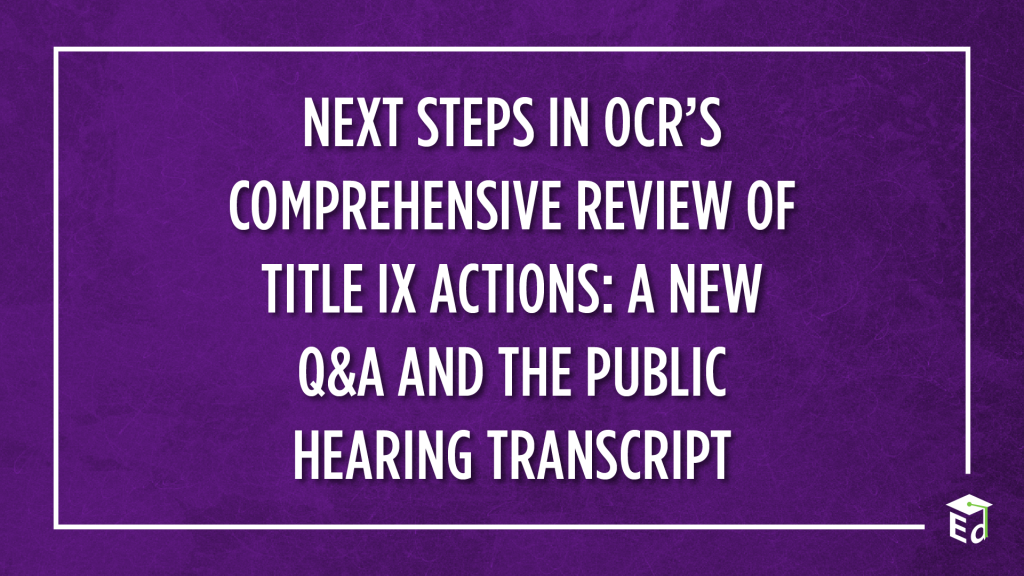Students, immigrant status and the right to public education
[ad_1]
The following is a cross message from the Civil Rights Office.
An essential element in ensuring equal opportunities is to protect all pupils in their access to education without discrimination. This includes the right of all students in the United States to attend U.S. public elementary and secondary schools, regardless of their immigration or citizenship status.
Students continue to have this right to public primary and secondary education after the Federal District Court ruling last Friday regarding the Deferred Action Policy for Childhood Arrivals (DACA), which prohibits the Department of Homeland Security approves new applicants but temporarily allows renewals for those who currently have DACA. Secretary Cardona said in response to the decision:
We are deeply disappointed with the recent decision of a Texas Federal District Court to block access to the Deferred Action Policy for Childhood Arrivals. The result will be detrimental to the promising young people who grew up here and shared their talents and energies with our communities. Many of these young people do not remember any other home.
Over the centuries, this nation – including our schools – has been enriched by those who have come to our shores from all over the world, seeking security, freedom and the opportunity to contribute to our democracy. We draw our strength from our diversity. I want to make it clear that by law, public primary and secondary schools remain accessible to any student, and no state can deny access to public education to any resident, regardless of their immigration status. . The US Department of Education’s Office of Civil Rights will continue to protect these rights for all students, including those affected by the ruling. We will ensure that public schools, colleges and universities across the country are welcoming, safe and supportive places where all students, regardless of their birthplace and immigration status, have the opportunity to succeed.
Here’s what you need to know about the right to a public education for students who are not U.S. citizens:
- A state cannot deny access to public education to any child residing in the state, including children who are not citizens and do not have immigration papers. The Supreme Court made this clear almost forty years ago in a case entitled Plyler vs. Doe.
- School districts cannot prohibit students from enrolling in public elementary and secondary schools because of the citizenship or immigrant status of the student or their parent or guardian.
- School districts cannot request information about the citizenship or immigration status of students or their families for the purpose or result of denying them access to educational opportunities.
- Students learning English have the right to appropriate language support services, and parents and guardians have the right to receive communications from their children’s school in a language they can understand.
We invite you to use these resources designed to help students, families, schools and districts understand the rights of undocumented students and the obligations of the schools that serve them:
- Dear Colleague, Letter on School Enrollment and Student Citizenship, Including Advice on Schools’ Obligations to Enable Students to Enroll in and Participate in a School’s Educational Services without Discrimination on the Basis of Student Status immigration of students or their parents or guardians.
- Dear Colleague, Letter on English Learners and Parents with Limited English Proficiency including advice on the rights of students learning English and the rights of parents and guardians who have limited English proficiency. ‘English.
- Information on the Rights of All Children to Enroll in School: Questions and Answers for States, School Districts and Parents, which answers questions about enrollment, documentation and measures to support students without papers.
- Fact Sheet: Information on the rights of all children to enroll in school, with information for families and school districts on documentation and enrollment policies.
- Resource Guide – Supporting Undocumented Youth, with information on legal guidelines, field models, and more to support students in primary, secondary and post-secondary education.
- Higher education institutions can continue to provide emergency grants through the Higher Education Emergency Assistance Fund to DACA recipients so that they can enroll and pursue post-secondary education.
Our nation draws its strength from our diversity and has excelled because of, not despite, the many people who have come to the United States from all parts of the world. We become even stronger when all students in the United States have full access to education, without discrimination. The Civil Rights Office of the Ministry of Education stands ready to provide this protection.
[ad_2]

